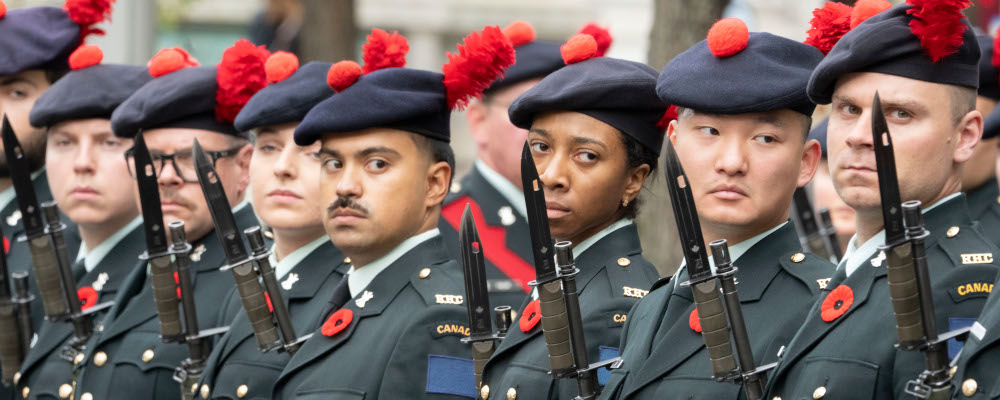Remembrance Day is the one time in the year that the lives and issues facing soldiers and veterans intrude into the public consciousness in any substantial way. Yet the image that is evoked is heavily based on the Second World War and Korean War experiences—conflicts that have directly affected a dwindling generation of individuals. Meanwhile, the lives and challenges of our current generation of soldiers and veterans are very different and not well understood.
The reality can be grim. A 2014 Statistics Canada Study showed that 48 percent of Canadian Armed Forces (CAF) members will experience a major mental health condition or alcoholic abuse in their lifetime. While currently serving personnel do not see an increase in suicide rates relative to the population, the suicide rate for male veterans after their release is 50 percent higher than the general population, 200 percent higher for female veterans, and 250 percent higher for male veterans under the age of 25.
These sorts of statistics, backed up by anecdotal evidence, cast a dour light on their overall military experience. I think the problem can be distilled down to a series of lies that exist at the heart of Canada’s relationship with its military members.
The government asks members of the Canadian Armed Forces for unlimited liability, and in return, CAF members trust the government to provide them with the tools to do their jobs and the policies and systems to take care of them in their most vulnerable times. This social contract is at the core of military service—and the government is essentially lying when it claims that it is upholding its side of the agreement. And due to that failure, soldiers often suffer a lifetime moral injury as a result.
First, it is fairly evident that military personnel are not being provided the resources required to carry out their jobs properly. In procurement, for example, considerations such as “social license” and “industrial and technical benefits” edge out the needs of soldiers, often leaving them with inadequate capabilities to achieve their missions. It often leaves soldiers across the CAF feeling disrespected despite their ongoing sacrifices,
But this is only one part of the issue. The CAF and Veterans Affairs Canada’s (VAC) personnel policies towards current and former military members are simply inadequate. It takes a certain type of person to join the CAF and remain in service for any length of time. In most cases, those very skills, knowledge, and work habits that are in demand within the CAF today are also highly sought after in the Canadian workforce—and often at significantly higher pay scales than what is offered within the military. CAF members are often shuttled to remote bases in places like Cold Lake, Shilo, or Oromucto, then sent on months-long deployments abroad. The continued outsourcing of key military benefits, such as housing and movement grants, and the inability to have a credible grievance mechanism, have produced a military experience that varies wildly from soldier to soldier in an already complex and stressful job.
Furthermore, spouses and families often bear the brunt of the challenging military lifestyle. Many of Canada’s bases are located far from major metropoles. Remember, with the CAF requiring more highly trained soldiers, it is likely that their spouses also have similar educational and employment skill sets—ones that cannot be met in remote military towns. While official statistics are scarce, there is some evidence suggesting that divorce rates for current and former military members are significantly higher than in the general population.
Most destructive is just how inept the government’s personnel management policies are. First, systems for overseeing current members and veterans employ antiquated data management systems, which creates barriers to accessing services.
This brings us to a broader point: the relationship between the bureaucracy and soldiers and veterans is not a harmonious one. At best it can be described as adversarial. At every step, current and former military members have to prove their eligibility for programs to skeptical public servants and/or contractors. They must become records packrats as they never know when a key piece of information will become critical to proving the validity of their claim.
The focus of the “system” seems like it is less there to assist individuals in need and more there to prevent the almost minuscule possibility that fraud may occur. This lack of trust manifests itself in so many different ways, altering health benefits for dependents, even for the widows/widowers of soldiers and veterans, cost of living rebates, and more.
Furthermore, even the programs and policy alternatives that are available are deliberately left unpublicized, perhaps in a misguided effort to keep departmental costs down. It is often through word of mouth or online communities that the existence of these policies (and how to access them) is disseminated amongst veterans or serving members. This illustrates the reality of the situation and the lie that the government is doing its best to help current and former military members. Rather, it actively works against them in some important instances.
Despite all of this, it can be surprising that so many members choose to remain in service to their country. Certainly, the higher calling that comes with public service is an important motivator: they strive hard to uphold their side of the social contract.
Another issue, though, is that there is also a “big lie” that current soldiers and veterans tell themselves to make it through: that everything is alright.
I can’t tell you how many allied personnel will rave about the relentless resourcefulness of Canadian military personnel. This is colloquially referred to as the “can-do” attitude. A culture of essentially getting things done regardless of the risk.
But there is more to it than that. Certainly, there was an element of masculinity that has inhibited soldiers from seeking help. Furthermore, the fears exist among personnel that acknowledging mental defects could impact their future service progression. The failure to repeal or mitigate Paragraph 98 (c) of the National Defence Act, which criminalizes self-harm, is one of several policies that stigmatizes those who suffer mental health episodes.

At its root, the broader CAF culture explains some of the relationship dynamics between superiors and subordinates. If soldiers are conditioned to not express how they feel, it makes it difficult for them to then turn around and be effective at dealing with the issues within their organization. We can laud the perceptive leaders who intrinsically understand the corrosive effect these issues have on their subordinates’ lives and try to rectify them, but it is a challenge for many in command positions because they have been conditioned within this culture to avoid these questions.
Moreover, there’s the pervasive reality that the CAF requires a unique culture to undertake its primary task of providing for the security and defence of Canada and its interests. As I mentioned in a previous column, the CAF’s culture is the glue that holds the force together in extremely difficult operations. Yet that focus on conformity can also result in destructive effects on some members’ psyche.
Given all of these considerations, it is not at all surprising that soldiers essentially lie to themselves about their situation in order to get through each day. Fortunately, they have a clear sense of purpose while serving their country; often, however, veterans do not. Many transition to civilian life feeling rudderless and alone, without the support structures that allowed them to operate at high levels while in the service. Even worse, some veterans are deliberately made to feel the burden of a system that was created to treat service-related injuries.
In the end, usurping these lies is not insurmountable, but it will require dedicated time, effort, and resources to overcome them. In short, robust political support across all parties has been lacking for many decades. Overhauling the relationship will have practical benefits that will go far beyond just meeting the needs of soldiers and their families. It will go a long way in addressing the retention and potentially the recruitment crisis that has deeply affected the CAF for the past decade.
But aside from that, it is just the morally right thing to do, and that really should be the guiding position for any policy in this area. Beyond just taking the time to remember their sacrifices for one day once a year, providing tangible improvements to the lives and working conditions of soldiers and veterans would be a meaningful way to thank them for their service.
Recommended for You

The Notebook by Theo Argitis: Carney’s One Big Beautiful Tax Cut, and fresh budget lessons from the U.K.

Christopher Snook: Is Canada sleepwalking into dystopia?

Rudyard Griffiths and Sean Speer: The fiscal hangover from the One Big Beautiful Bill hits Canada

‘A fiscal headache for Mark Carney’: The Roundtable on how Trump’s One Big Beautiful Bill could affect Canada




